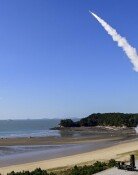Wild fluctuation in foreign policy
Wild fluctuation in foreign policy
Posted March. 11, 2001 18:55,
President Kim Dae-Jung`s latest trip to Washington showed more than clearly how haphazardly Seoul`s foreign policy, its North Korea policy in particular, is being conducted.
President Kim said he would focus on seeking increased detente on the basis of reviving the now dormant inter-Korean basic agreement of 1992, in lieu of exploring a peace accord or peace declaration when North Korean leader Kim Jong-Il makes his forthcoming visit to Seoul. This was far different from what he told the press a week before his trip to the United States, at which time he suggested that he would look to sign either a peace agreement or a peace declaration with North Korea on concrete concerns, including military matters, when the Northern strongman is here.
Such a reversal of his earlier stance was apparently influenced by Washington`s reluctance to back Seoul`s bid for a peace agreement or a peace declaration by the two Koreas. We might well appreciate the nuanced difference between the two countries on that score, yet it was out of place for the president to have so effortlessly declared his intention without foreseeing or measuring the position of his counterpart, the United States. Pyongyang is still apparently sticking to its policy of seeking a peace treaty with Washington. At this juncture, it was most embarrassing to see the Seoul government broaching a peace agreement or a peace declaration abruptly and then stepping back from this a short time later.
The same could be said of the controversy over the national missile defense (NMD) system that is being promoted by the United States. Seoul appeared to be leaning toward the negative on the question of the NMD. The Ministry of Foreign Affairs and Trade tried to explain away the government`s concurrence with Russian President Vladimir Putin`s statement of support for the anti-ballistic missile (ABM) treaty by claiming that the wording had been chosen from the standard phraseology accepted by the international community. However, President Kim said in an apologetic tone in the United States that South Korea was not opposed to the NMD plan and that the reference to the ABM treaty would have been better left out of the joint Russo-Korean statement.
To pave the way for the president`s U.S. trip, Foreign Minister Lee Joung-Binn and National Intelligence Service director Lim Dong-Won went all the way to Washington to outline the Seoul government`s North Korea policy and coordinate the stands of the two allies in order to facilitate the upcoming summit talks. The two officials said they had worked closely with policy makers of the Bush administration. But we have to wonder what advance coordination both Lee and Lim achieved.
On no previous occasion has the Korean head of state ever eaten his words and offered apologetic statements in the course of an official tour of a foreign country. No one can be sure whether advance preparations were completely lacking or the Seoul government wrongly thought that the Bush government could be pushed around. Anyway, unquestionably large-scale and absurd mistakes were committed by our side. Appropriate at this juncture would be efforts to take stock of the mistakes and thoroughly account for their consequences.







